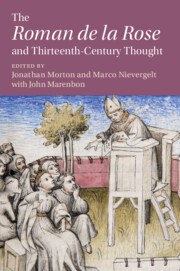Book contents
- The Roman de la Rose and Thirteenth-Century Thought
- Cambridge Studies in Medieval Literature
- The Roman de la Rose and Thirteenth-Century Thought
- Copyright page
- Contents
- Contributors
- Acknowledgements
- Note on Primary Texts
- Introduction
- Part I Epistemology and Language
- Part II Natural Law, Politics, and Society
- Part III Unfinished Business
- Notes
- Bibliography
- Index
- Cambridge Studies in Medieval Literature
Introduction
Published online by Cambridge University Press: 17 June 2020
- The Roman de la Rose and Thirteenth-Century Thought
- Cambridge Studies in Medieval Literature
- The Roman de la Rose and Thirteenth-Century Thought
- Copyright page
- Contents
- Contributors
- Acknowledgements
- Note on Primary Texts
- Introduction
- Part I Epistemology and Language
- Part II Natural Law, Politics, and Society
- Part III Unfinished Business
- Notes
- Bibliography
- Index
- Cambridge Studies in Medieval Literature
Summary
The introduction gives an overview of the Rose’s engagement with thirteenth-century thought. It considers how the text’s game with the literal and allegorical senses of its words frustrate attempts to take unambiguous meaning from its poetry. It considers how the poem’s deliberate ambiguity responds to the context of its composition, both to the context of the University of Paris, racked by philosophical controversies in second half of the thirteen century, and to contemporary trends in satirical, philosophical poetry, strongly influenced by Roman poet Ovid, exemplified by the De amore of Andreas Capellanus. After a consideration of the Rose’s influence on later medieval poetry, the introduction gives an overview of the different chapters in the collection.
- Type
- Chapter
- Information
- Publisher: Cambridge University PressPrint publication year: 2020

